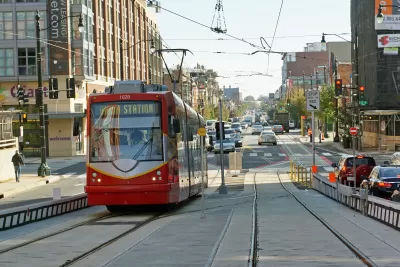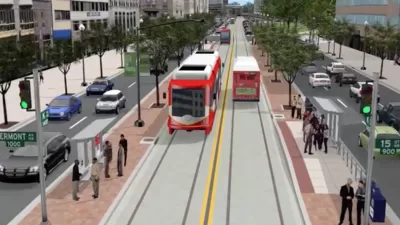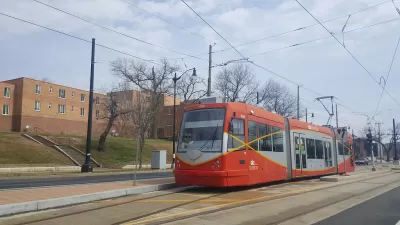Washington D.C.'s new streetcar line opened to a chorus of media naysayers who mocked the slow moving transit, but reality shows it's not quite as slow as some would have you believe.

It's not breaking any land speed records, but that was never the point. In a post on Greater Greater Washington, Ben Bowman writes that the media pile-on during the opening of the new D.C. streetcar line mischaracterized the speed and purpose of the new transit line. Bowman points to an article in the Washington Post that claimed that one could walk faster than the streetcar could travel, end-to-end along its route. This in fact may have been true during the opening, however speeds have appeared to pick up as regular service has begun.
As for the streetcar's speed, more recent articles say it's taking an average of 18-20 minutes to get from end to end. In fact, in the inaugural "Running of the Streetcar", many runners couldn't outpace the Streetcar, even when starting with a small lead...
The fact of the matter is that people have underestimated how much time it would take to walk the streetcar route, and overstated how much time it takes the streetcar itself to travel it. Really, taking the DC Streetcar is about twice as fast as walking.
Bowman writes that it's important to set the record straight, particularly as plans to expand the streetcar system will rely on public support.
FULL STORY: Taking the streetcar is, in fact, way faster than walking

Planetizen Federal Action Tracker
A weekly monitor of how Trump’s orders and actions are impacting planners and planning in America.

San Francisco's School District Spent $105M To Build Affordable Housing for Teachers — And That's Just the Beginning
SFUSD joins a growing list of school districts using their land holdings to address housing affordability challenges faced by their own employees.

The Tiny, Adorable $7,000 Car Turning Japan Onto EVs
The single seat Mibot charges from a regular plug as quickly as an iPad, and is about half the price of an average EV.

Seattle's Plan for Adopting Driverless Cars
Equity, safety, accessibility and affordability are front of mind as the city prepares for robotaxis and other autonomous vehicles.

As Trump Phases Out FEMA, Is It Time to Flee the Floodplains?
With less federal funding available for disaster relief efforts, the need to relocate at-risk communities is more urgent than ever.

With Protected Lanes, 460% More People Commute by Bike
For those needing more ammo, more data proving what we already knew is here.
Urban Design for Planners 1: Software Tools
This six-course series explores essential urban design concepts using open source software and equips planners with the tools they need to participate fully in the urban design process.
Planning for Universal Design
Learn the tools for implementing Universal Design in planning regulations.
Smith Gee Studio
City of Charlotte
City of Camden Redevelopment Agency
City of Astoria
Transportation Research & Education Center (TREC) at Portland State University
US High Speed Rail Association
City of Camden Redevelopment Agency
Municipality of Princeton (NJ)





























